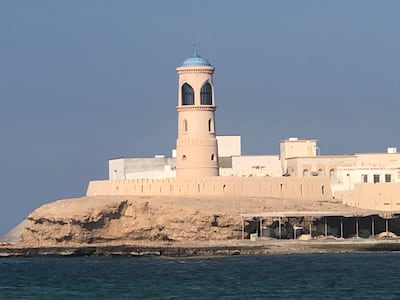Oman’s north-eastern coastal town of Sur seems an unlikely place for a thriving African music scene, but its roots go back centuries.
From the ever-present beat of drums to mixed Arabic-Swahili songs and age-old social traditions, all of this leads back to the seafaring days of the 18th and 19th centuries, when dhows ploughed the routes between this town and Zanzibar, and Oman ruled much of the East African coastline.
Since then, the coastal resort has fallen into obscurity, yet what remains is clear evidence of the rich Afro-Omani heritage of which people are proud. Many still consider Sur the heartland of Swahili music in the Sultanate.
“The culture and heritage that was brought back to Sur from Zanzibar still thrive today,” says Nabila Al Farsi, 26, a singer from Sur. “We are proud of it since it has been embedded in us for more than a couple of centuries. We will continue to pass it to the future generations like our ancestors have been doing for years.”
Al Farsi performs at wedding parties, singing Swahili rhymes such as “Niko mbali kutoka nyumbani lakini nime powa”. This translates to “I am far away from home but I am fine”. It is an old song, seemingly a reminiscence of the first East African settlers a few centuries ago.
Omani families in Sur continue to teach their children to play Swahili instruments, a skill that has been passed down through the generations.
“We teach our children to play the tambura, which is a string instrument, the misundu, which is a tall cylindrical drum, and the zoomari, made from a bull’s horn,” says Jamal Al Gheilani, who makes musical instruments. “We use these on special occasions, weddings or any kind of celebrations.”
Throughout the pandemic, musicians have even brought out their instruments to play at weekends in town squares and on beaches, to help distract people who have experienced loss because of Covid-19.
“We abide by the rules [now in place owing to the pandemic], but we still play our music outside [restricted] hours,” says veteran singer Fareed Al Alawi, 66. “We don’t wait for special occasions. Weekends are a perfect excuse to play music and, do you know something else? We now find music beats the depression [that has arisen from having to stay home]. We do people a favour by playing live music to forget coronavirus blues and members of their families lost in it.”
Salah Faraj, 44, is one of those making sure the spirit of Swahili music in Sur remains alive. “It is a nostalgia that has survived for at least two centuries … Most of us know where we come from and we want to keep the Swahili tradition going as long as we can.
“Besides, it is part of the Omani history … For all of us here in Sur, it is important to keep it going for the future generation. Not only in the town of Sur but for the rest of the country, too.”

Oman no longer rules Zanzibar, which is now a semi-autonomous part of Tanzania, but influence between the two nations can still be seen, whether it’s in the architecture, cuisine, music or even how the people speak.
“Omani sailors those days did not only bring back instruments, music and dances, but the language, too,” says Sur historian Hassan Fahad, 86. “They also brought back boatbuilding from timber, carpet and basket-weaving from palm fronds, better fishing techniques, kitchen utensils made from the soil.”
Fahad says Oman carved out its East African empire when seafarers from Sur started navigating beyond the shores of the Sultanate.
“Sur was also an important seafaring port of Oman. Sailors from here first started sailing to East Africa looking for a better life and places to settle to escape the heat. Then they found out they could bring back animal skins, spices and even young people who could work in the fishery industry and farming.”
In doing so, the seafarers unwittingly made Sur an important trading post, before modern jets and sea liners took over.
To this day, foreign tourists cannot help but notice the African influence in Sur. “It is amazing,” says Peter Birkshall, an Irish tourist visiting the town from Qatar with his family. "Sur is a treasure of the Middle East. How can a small town in the middle of Arabia have so much African heritage?
The Swahili lyrics in the songs, the dance rhythms, the boats that have an African signature, even some of the architecture of their houses and the food, too. There is an African tradition in almost every corner you turn into.”
Birkshall, who is a regular visitor of Oman, says it’s time Sur received the same recognition as major tourist destinations such as Salalah, located in the south, where about half a million tourists go every year.
“If we can have khareef in Salalah during the summer, we can have Sur promoted at any time of the year. It is all about promoting it and marketing it properly to tourists.”

